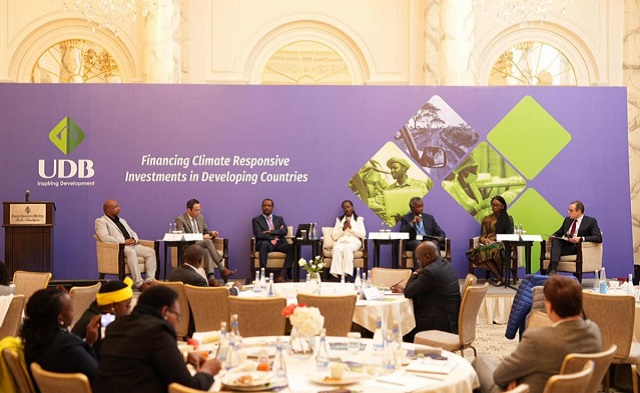
Domestic banks, pension funds and financial institutions play a critical role in mitigating these climate-related risks and providing partners with the tools to invest with confidence
ANALYSIS | THE INDEPENDENT | State-owned development financing institution, Uganda Development Bank on Nov.15 convened a high-level meeting with key stakeholders on the sidelines of the 29th Conference of the Parties (COP 29) to foster partnerships aimed at mitigating climate change in Africa and integrating climate considerations into development finance.
Led by the Bank’s Managing Director Patricia Ojangole, the Climate Finance Breakfast Roundtable brought together a diverse group of participants from the sustainability and finance sectors, including government officials, financial institutions, and international organizations operating in Africa and other developing regions.
During the high-level meeting, the panel underscored the urgent necessity of directing more financial resources towards climate-friendly projects. Speakers shared practical examples and strategies for financing green projects and highlighted opportunities for cooperation and co-investment.
Ojangole said while developing nations like Uganda are on the frontlines of climate change, they also show innovation and contribute valuable solutions to the climate crisis. She stressed that climate-responsive investment in Uganda and the broader African continent is imperative.
She pointed out that UDB’s Climate Finance Facility is designed to address these challenges. “The Bank established the Climate Finance Facility to coordinate green financing initiatives in the Bank, provide technical support in structuring green interventions, provide guidance regarding the green financing options, identify and assess low carbon and climate resilient investments, and propose suitable adaptation and mitigation strategies for projects,’ she said.
“The idea is to deliberately finance interventions that target reducing emissions and building the resilience of Ugandans to the impacts of climate change.”
In addition, she highlighted the supportive policy environment in Uganda as a key draw for investors keen on supporting climate projects in the country.
“As UDB we have been able to develop a robust policy framework that supports our engagements with governments, funders, partners and other stakeholders,” she said.
Ojangole argued that the Bank is not only focused on mobilizing climate finance, but on building a pipeline of bankable projects.
“We’re working with the private sector to be able to structure projects in a way that capital can be mobilized. When you do that then it becomes easy to engage partner,” she added.
She stressed that the Bank has successfully mainstreamed climate considerations into all facets of its operations.
“There has been a mindset shift within the Bank and what we have done is to mainstream climate consideration. We now talk about agrifood systems, sustainable industrialisation and a sustainable service sector.”
Climate crisis escalated
Ibrahima Cheikh Diong, the newly elected Executive Director of the Fund for Responding to Loss and Damage, noted in his keynote address that the climate crisis has escalated to the level where some impacts already go beyond what people can adapt to, such as the loss of life and livelihoods due to extreme floods and wildfires.
Diong called on governments in Africa to view climate change not as a crisis, but an opportunity to accelerate development and enhance access to water, energy and transportation in a sustainable way. To achieve this, policymakers must prioritize developing the right set of incentives to build a pipeline of bankable projects and attract private investors.
“The whole issue is around incentives. What is the government willing to do in terms of policy incentives to make climate projects attractive to investors; what is the government prepared to do to make sure public private partnerships are possible,” he said.
Joseph Ng’ang’a, Vice President for Africa, Global Energy Alliance for People and Planet (GEAPP), who was the special envoy overseeing last year’s Africa Climate Summit emphasised the need to take a regional approach to achieve scale, as well as attract international partners.
“Private capital must get the right rusk return ration to be attracted. We must think from a systems perspective and a regional perspective to ensure that we’re optimizing,” he stated.
Nganga lauded Uganda’s government for establishing a progressive and competitive policy environment. “Uganda is showing tremendous leadership and is very innovative in terms of driving green investment. It set out a high-grade funding system to encourage electricity connections to the poorer parts of the country to ensure that everyone has access to electricity,” he said.
Need for climate-resilient infrastructure
Marco Serena, Group Chief Sustainable Impact Officer, The Private Infrastructure Development Group (PIDG), stressed the importance of building climate-resilient infrastructure in Africa, while Lanre Shasore, Senior Advisor for Energy Transition Planning at Sustainable Energy for All (SEforALL), emphasized the organisation’s collaborative efforts with the United Nations and leaders from the government, the private sector, financial institutions, and philanthropies.
She stated that these partnerships aim to accelerate progress toward achieving Sustainable Development Goal 7, which seeks to ensure access to affordable, reliable, sustainable, and modern energy by 2030.
She also highlighted the currency risks facing different African economies, citing the example of Nigeria. Domestic banks, pension funds and financial institutions, she noted, play a critical role in mitigating these risks and providing partners with the tools to invest with confidence.
 The Independent Uganda: You get the Truth we Pay the Price
The Independent Uganda: You get the Truth we Pay the Price






